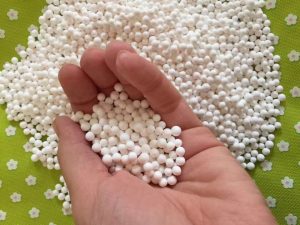Activated Alumina Gamma Alumina Catalyst Carrier
- white,spherical porous material
- non-toxic, odorless, not powdering, insoluble in water and alcohol
- even micro-holes, appropriate aperture size, big pore volume, high water absorption, small bulk density
- good mechanical properties, good stability, suitable for catalyst Carrier

Activated Alumina Gamma Alumina Catalyst Carrier USAGE APPLICATION
- The Co-Mo sulfur-resistant shift catalysts produced by Activated alumina catalyst carrier has good low-temperature activity, width working temperature, short vulcanization time and other merits, it is applicable to small and medium sized ammonia factory.
- In the natural gas and petrochemical refining industrial process, to the hydrogen sulfide, can use activated alumina as catalyst for sulfur recovery.
- The most widely application for activated alumina catalyst carrier is hydrotreating, it can raise H/C ratio and get rid of O, S, N, finally can remove V, Ni and other contaminants.
- Another application for the activated alumina catalyst carrier is automobile exhaust catalyst, it can promote the oxidation of hydrocarbons, carbon monoxide and nitric oxide in exhaust gas, reduce air pollution.
- In the petroleum hydrocracking, hydrogenation refining, hydrogenation reforming, drogenation reaction and automobile exhaust purification process, activated alumina catalyst carrier plays an important role.
- Used for Alcohol dehydration, olefin isomerization, hydrogenation, oxidation and polymerization
Activated Alumina Gamma Alumina Catalyst Carrier specification
| Item | Unit | Index |
| Αl2O3 | % | ≥92 |
| SiO2 | % | ≤0.50 |
| Fe2O3 | % | ≤0.05 |
| Nα2O | % | ≤0..45 |
| Loss on ignition | % | ≤7.0 |
| Bulk density | g/ml | ≤0.65 |
| Specific surface | m2/g | ≥170 |
| Pore volume | ml/g | ≥0.40 |
| Crush strength | N/p | ≥80 (3-5mm) |
Al2O3=100-(SiO2+Fe2O3+Na2O+Loss on ignition)
Packing
25kg/bag, 150kg/steel drum, 800kg/jumbo bag or according customers requirement.
welcome inquiry us carrier@catalystcarrier.net
What is gamma alumina ? Alumina Introduction
Alumina has been found to exist at least 8 form, they are α- Al2O3, θ-Al2O3, γ- Al2O3, δ- Al2O3, η- Al2O3, χ- Al2O3, κ- Al2O3 and ρ- Al2O3, their respective macroscopic structure properties are also different. Gamma -Al2O3 is a cubic close packed crystal, insoluble in water, but soluble in acid and alkali. Gamma Al2O3 carrier is weak acidic support, has a high melting point 2050 ℃, alumina gel in hydrate form can be made into the oxide with high porosity and high specific surface, it has transition phases in a wide temperature range. At higher temperature, due to dehydration and dehydroxylation, the Al2O3 surface appears coordination unsaturated oxygen (alkali center) and aluminum (acid center), with catalytic activity. Therefore, alumina can be used as carrier, catalyst and cocatalyst.
γ-Al2O3, was called “ activated alumina”, is a kind of porous high dispersion solid materials, because of its adjustable pore structure, large specific surface area, good adsorption performance, surface with the advantages of acidity and good thermal stability, microporous surface with requisite properties of catalytic action, therefore become the most widely used catalyst, catalyst carrier and chromatography carrier in the chemical and oil industry, and plays an important role in the oil hydrocracking, hydrogenation refining, hydrogenation reforming, dehydrogenation reaction and automobile exhaust purification process.
γ-Al2O3 is widely used as catalyst carrier because of the adjustability of its pore structure and surface acidity. When γ- Al2O3 is used as a carrier, besides can have the effects to disperse and stabilize active components, also can provide acid alkali active center, synergistic reaction with the catalytic active components. The pore structure and surface properties of catalyst depend on γ-Al2O3 carrier, so high performance carrier would be found for specific catalytic reaction by controlling the properties of γ-Al2O3 carrier.
Gamma Al2O3 is generally made of its precursor pseudo-boehmite through 400~600℃ high temperature dehydration, so the surface physicochemical properties is largely determined by its precursor pseudo-boehmite, but there are many ways to make pseudo-boehmite, and different sources of pseudo-boehmite leads to the diversity of gamma – Al2O3. However, to those catalysts with special requirements to alumina carrier, only rely on the control of precursor pseudo-boehmite is difficult to achieve, must be taken to prophase preparation and post processing combining approaches to adjust the properties of alumina to meet different requirements. When the temperature is higher than 1000 ℃ in use, alumina occurs following phase transformation: γ→δ→θ→α-Al2O3, among them γ、δ、θ are cubic close packing, the difference only lies in the distribution of aluminum ions in tetrahedral and octahedral, so these phase transformation does not cause much variation of the structures. Oxygen ions in alpha phase are hexagonal close packing, aluminum oxide particles are grave reunion, specific surface area declined considerably.
